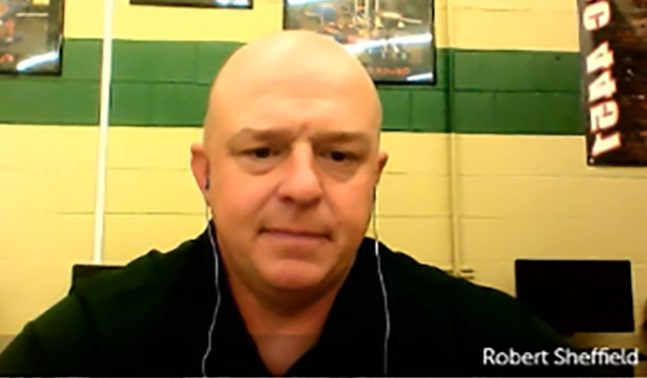
CLEMSON, South Carolina – Science can be taught from a textbook, but it is lived in action. When teachers experience it firsthand, it can translate to rich, memorable opportunities for their students that rise above typical lessons.
Rob Sheffield, a physics teacher at Laurens District 55 High School, has gained hands-on physics research experience at Clemson University that not only enriched his teaching but also afforded him the opportunity to share the results of his efforts. Sheffield was invited to attend a weeklong virtual workshop organized by Eric Mazur at Harvard University and aimed at improving and supporting high school physics education. Sheffield came away from the experience brimming with enthusiasm.
The July 13-17 workshop, funded by the National Science Foundation, brought together secondary physics educators, administrators and methodology experts to discuss the current state of secondary-school physics teaching. Sheffield joined instructors from the United States and Europe and will also have priority access to an in-person workshop to be held at Harvard in summer 2021.
Sheffield’s experience was made possible by a Research Experiences for Teachers (RET) award that was obtained with the help of Rod Harrell, a faculty member in the Holcombe Department of Electrical and Computer Engineering. Harrell, who runs a Research Experience for Undergraduates (REU) program, collaborated with College of Science professors Sean Brittain and Chad Sosolik to add the NSF-funded RET support to his program (NSF Award No. EEC-1560070).
Brittain and Sosolik have run the RET as part of their work with PhysTEC, the Physics Teacher Education Coalition. PhysTEC is a partnership between the American Physical Society and the American Association of Physics Teachers that has been designed to help physics departments recruit and train physics educators.

Brittain and Sosolik were selected to be part of the second cohort of PhysTEC Fellows in 2019.
“Chad and I started a collaboration with the Laurens School District probably five years ago now,” said Brittain, who is chair of the department of physics and astronomy. “We worked with teachers to provide workshops on math and physics to boost their content knowledge of those subjects with the goal of creating a culture of STEM in the schools.”
Sheffield said he had to learn to become a student again.
“This is a whole different way of thinking about physics, and I think it’s correlated to my classroom where I can talk to my students about – for those who are going into a STEM field – what they can expect in a research environment,” he said. “You’re not going to have all the answers, but don’t let that intimidate you. You can dive into the deep end of the swimming pool and you will figure it out.”
The workshops went beyond the science classroom.
“These are teachers from kindergarten through high school – art teachers, music teachers, a little bit of everything,” Brittain said. “Our goal was to make it clear that science is for everybody. It touches every part of our daily lives and can be integrated across the curriculum.”
An outgrowth of that project was establishing an RET program at Clemson to allow teachers to participate in hands-on research on campus during the summer.
“Rob has participated with us for three years, and this would have been a fourth if we hadn’t been scrubbed by COVID-19 this summer,” said Sosolik, a senior researcher in the department of physics and astronomy. “Rob fits into our plans in that we need a master teacher who does physics and connects us with the school system. He’s the perfect fit. It’s icing on the cake that he gets the opportunity to participate in what is a National Science Foundation-funded effort from RET.”

“Rob is one of those teachers who has done this and spent several summers in Dr. Sosolik’s lab doing research,” Brittain added. “He has really benefitted that lab and, I think it’s fair to say, benefited his own perspective on what physics looks like in the laboratory.”
And this carries over exceptionally well to Sheffield’s classroom.
“His comfort level with the material is spectacular,” Brittain said. “With this learning approach, you get questions from students that go beyond the textbook. You’ve got to be able to think on your feet. He’s positioned now to have a huge impact on the students who come through his physics class at Laurens High School. His enthusiasm spills over not only to his class, but to other teachers. It changes the culture.”
Brittain said this important partnership has the potential to impact schools and students across South Carolina. He said the pandemic – and the resulting virtual learning at his own home – reinforced to him that college faculty and K-12 teachers can benefit each other.
“They have a very special expertise that is irreplaceable,” Brittain said. “We have something to offer, and that’s the content. This really is a partnership. We’ve learned a lot about teaching, about how students learn, what it is they need in order to make progress through high school. And we’ve been able to give them a front-row seat to the scientific process. It’s really gratifying to see that this doesn’t just work in theory. It works in practice. Rob’s a great example of that.”
Get in touch and we will connect you with the author or another expert.
Or email us at news@clemson.edu

